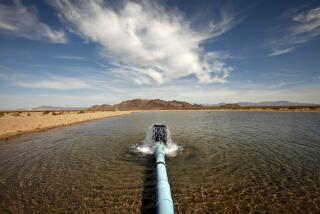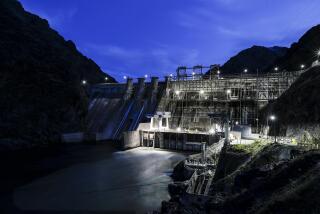Chad Pipeline Project Puts World Bank on the Spot
- Share via
WASHINGTON — The World Bank is nearing a vote on whether to proceed with one of the largest, most contentious African development projects in recent memory.
The proposal, a 650-mile oil pipeline through Chad and Cameroon, pits endangered elephants and rare gorillas against multinational oil companies and Wall Street financiers, African forest dwellers against local government officials of dubious legitimacy.
No wonder the Chad-Cameroon pipeline attracted the wrath of the anti-globalization protesters who blocked Washington’s streets last month during the spring meetings of the World Bank and the International Monetary Fund.
The project has turned into a referendum on the World Bank’s role in poor countries. Is it a Trojan Horse for greedy capitalists and environmental outlaws, or the world’s best hope for responsible development that can lift millions out of poverty?
The question isn’t new, but the street protests and public recriminations are. Like the IMF after the Asia economic crisis, the World Bank has come under a harsh spotlight as doubts are raised about the effects of globalization on poor nations and the environment.
The Cameroon-Chad pipeline project, repeatedly delayed by such concerns and now facing a June 6 funding decision by the bank, lays out the issues in sharp relief.
It’s been known for 30 years that oil lies beneath the soil of what is now southern Chad, but until recently, no one could imagine a practical way of getting it out. Deep inland, the oil fields are separated from the nearest ocean terminal by disputed lands in a region where less than 1% of the roads are paved.
Now, though, a consortium of three oil companies--Exxon Mobil, Chevron and Petronas, the Malaysian national concern--believe that conditions in the region are stable enough to risk drilling about 300 oil wells in southern Chad and building the necessary pipeline to the coast.
The three oil companies are supposed to shoulder $3 billion of the $3.5-billion cost themselves. The World Bank is deciding whether to lend $200 million to Chad and Cameroon and to pull together a package of $300 million from the world’s commercial banks, which wouldn’t lend money in sub-Saharan Africa on their own.
The project’s proponents say the money might mean the difference between life and death for thousands of people. About 60,000 children now die each year in Chad before they reach the age of 5.
“Chad is one of these places where you’ve got real, hard choices,” said John Dixon, a staff environmentalist at the World Bank.
He ticked off some grim statistics: Chad ranks 191st out of 206 countries in per-capita income; life expectancy in Chad is only 48 years; 82% of its men and 95% of its women work in agriculture even though just 2.5% of its land can be farmed.
“Almost a quarter of a million children will die during the four years the pipeline is being built,” one bank report warns.
The bank further asserts that the revenue flows from oil could deliver “a large number” of these children from their poverty-imposed death sentences.
In the teeth of those arguments, environmentalists warn that the pipeline would snake through Cameroon’s moist tropical forests, bringing development--and, most likely, logging and poaching--into remote regions where elephants, gorillas and the people widely known as Pygmies now live in relative seclusion. How would an oil spill be cleaned up in a place like this?
And there are no guarantees that the neediest citizens of Chad and Cameroon would ever see any benefits from the millions in oil revenues received by their governments. Cameroon has the dubious distinction of being ranked most corrupt of 99 nations studied by nonprofit organization Transparency International. (Chad was not included in the ranking.)
“Somehow, the bank seems to think they can control the situation,” said Korinna Horta, senior environmental economist with Environmental Defense. “This is a complete illusion, in my opinion. I can’t understand why the bank wants to take this risk.”
Horta even fears that the oil money could touch off a new round of fighting in the region. The stronghold of the armed opposition to Chad’s government is in the south, she said--precisely where the oil is. She envisions an escalation of violence as the southern rebels fight to control the resource under their land.
“As soon as the oil money is there,” she predicted, “the government is going to have a lot of cash to buy whatever weapons they please, and smash whoever they don’t like.”
Environmentalists, citing the ill-fated trans-Amazon highway in Brazil and a variety of projects in the Marcos-era Philippines, have been complaining for years that large World Bank infrastructure developments endanger wildlife, dislocate indigenous peoples, encourage cronyism by corrupt government officials and leave the poor worse off than before.
The bank has responded with a wide array of internal reforms. In the last 10 years, it has beefed up its environmental staff, opened its decision-making processes to outside advocates and created an independent review board that acts as a kind of courthouse for Third World peoples with complaints about World Bank projects.
Further, the bank has distanced itself from some of the most controversial types of development lending--for logging projects in tropical forests, for instance, and projects that would relocate large numbers of villagers.
Instead, it has tried to fund small-scale “green” projects such as national parks and sewage systems. And in recent years, it has restructured its loan portfolio in favor of “structural adjustment” loans to needy governments, reducing its emphasis on big dams, highways and other mega-projects.
Frances Seymour, director of the institutions and governance program at the World Resources Institute, doesn’t deny this. But she argues that the improvements have not yet permeated the bank’s fundamental culture, which, she says, puts the greatest value on getting loans out the door--not on promoting sustainable development.
“It is still the exception, rather than the rule, when bank staff design sector- or country-level strategies with environmental sustainability in mind as a principal objective,” Seymour said.
For the Chad-Cameroon pipeline, the bank’s reforms have meant extensive research and a public consultation period. In response to some of the problems identified in advance, the bank’s engineers have rerouted the pipeline away from some of the most sensitive ecological zones.
And in response to fears the oil revenues would not trickle down to the poor, the bank set up a revenue management plan calling for 80% of the money to go to education, health, rural development and similar goals--and providing for a public audit of the money trail.
In 1994, the World Bank launched an Independent Inspection Panel, a court-like body that is supposed to hear the grievances of indigenous peoples affected by bank-financed projects. But panel members from the host countries of proposed projects have been reluctant to say anything that might jeopardize a project back home.
The upshot: Twenty-one formal claims have been brought since the panel began operations, but only one has led to the cancellation of a disputed project--a dam in Nepal.
This state of affairs is evidence, environmentalists say, of the World Bank’s failure to make sustainability a central goal.
“The focus has been on safeguards, and on mitigating the damage” of projects, said the World Resources Institute’s Seymour. But the projects go forward nevertheless.
“This doesn’t focus on the positive side of the ledger,” she said. “The proactive side would look at the existing assets of Chad and Cameroon and figure out what is the best, most sustainable way to develop them. That’s what doesn’t happen.”
Which misses the point, said Robert Calderifi, chief of African external affairs for the World Bank: The region has almost no resources for sale on world markets and, apart from the oil, almost no hope of getting any.
“The continent that is developing most slowly, Africa, is not suffering from globalization,” he said. “It’s suffering from a lack of globalization. . . . The choices are either to let Chad go on being very poor or to give it the chance to transform itself into a somewhat poor country.”
More to Read
Sign up for Essential California
The most important California stories and recommendations in your inbox every morning.
You may occasionally receive promotional content from the Los Angeles Times.













